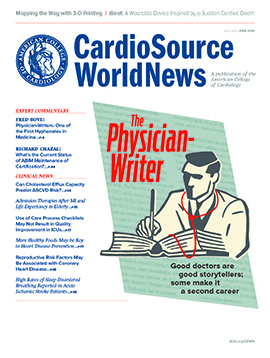Editor's Corner: Is AF Contributing to Dementia? | Alfred A. Bove, MD, PhD Editor-in-Chief, CardioSource WorldNews
CardioSource WorldNews | Over the past few months, Bill has seemed a little forgetful. He is 81-years-old, long retired but active, with a history of hypertension and well-controlled atrial fibrillation (AF) for the past 15 years. Because of his wife’s diligence regarding his INR, he rarely gets out of range either above or below the therapeutic target.
On their last office visit, his wife asked whether statins can cause dementia. Some of her friends have stopped statin medications because of the ongoing debate regarding a possible link between statins and dementia. Yet, the randomized clinical trials, and the observations from large registries, don’t support a connection between statin use and dementia. Because loss of brain function is a common occurrence in an elderly population, we look for relationships that might explain a reduction in cerebral function.
We all accept some reduction in cognitive function with aging and don’t call it dementia. Formal testing can define dementia, but most patients don’t get too concerned with slight memory loss, balance problems, reduced coordination, or other minor functional changes that occur with advancing age. However, when debate regarding such issues spreads across the medical community—and into the press—patients get concerned.
Lately, there has been concern regarding AF and its relationship with dementia. There are a number of potential mechanisms, one of which is the possibility that small emboli are shed from the atrium and accumulate, limiting blood flow to the brain, and leading to a perceptible reduction in mental function. These have been classified as micro-strokes, mini-strokes, and “whispering” strokes; but, whatever you call them, the consequence is a progressive loss of mental function due to embolization from the left atrium.
Avoidance is difficult. With a patient in permanent AF, stopping anticoagulation actually increases the risk of stroke and we all have witnessed a patient who failed to take anticoagulants for their AF who then experienced a devastating stroke involving a significant portion of their brain. However, when considering dementia, the various etiologies are also important. Vascular dementia due to obstructive cerebral vascular disease could be related to AF from multiple micro-emboli, but that cannot explain Alzheimer’s-type dementia. Similarly, micro-bleeds, which might be the result of excess anticoagulation, might be another contributing factor to cognitive decline.
Consequently, determining all these relationships and their impact on patients cannot be discerned from observational studies. Most studies relate different forms of dementia to a variety of cardiovascular disorders. Look at the research and you’ll see patients with heart failure, ischemic heart disease, congenital heart disease, AF, and hypertension, all demonstrating some relationship with dementia.
We are all comfortable with telling a patient with AF that they need an anticoagulant to avoid a stroke. This is true for warfarin and for the non-vitamin K oral anticoagulants (NOACs), where the clinical trials indicate that the risk of bleeding and stroke is lower with a NOAC than with warfarin. However, we don’t yet have solid data on dementia risk with either warfarin or the NOACs. Small trials comparing NOACs to warfarin in patients with AF suggest a slightly lower risk of dementia with a NOAC, but these data are suggestive and not definitive.
To really answer the questions being debated today, we must wait for larger, randomized trials. Research on dementia is moving forward at a rapid pace because of the increasing number of older adults and the need to reduce risk given the long-term costs of caring for elderly dementia patients.
To fully understand the relationship between AF and dementia, we first need to properly categorize the various forms of dementia. If we are concerned with AF, the most likely link will be between vascular dementia and AF, but other forms of dementia seem to have an association with AF, too, as well as with other forms of chronic heart disease.
Clinical trials are needed that both characterize the dementia clinically, and provide quantifiable measures from standardized tests and vascular images that can be compared over time. Meanwhile, we need to continue anticoagulation to avoid strokes in our AF patients. Whether NOACS are a better choice is still to be determined, but data from small studies suggests that they do lower dementia risk in our AF patients compared to warfarin.
Perhaps the only certainty: offering no anticoagulation therapy in a patient with AF is a much riskier approach. I haven’t mentioned aspirin, but there is a growing consensus that what little stroke protection might be gained from aspirin is offset by the considerable risk of bleeding. Indeed, as this issue of CSWN was going to press, a study in JACC indicates that 40% of people with AF are wrongly prescribed aspirin rather than more effective therapies.1 Indeed, the analysis of NCDR® data finds that such an approach in this AF population at moderate- to severe-risk of stroke has a net negative effect. And the role of Watchman® is still being defined.
At present, treatment of AF focuses on rate or rhythm control and stroke prevention. The strokes we want to prevent are the large ones that cause an abrupt change in function, long-term disability and, often, prolonged supportive care. Our therapeutic goals and clinical trials all focus on prevention of clinically evident strokes, but as we learn more about brain function in AF patients we may need to add microstrokes to our concepts about AF.
Reference:
- Hsu JC, Maddox TM, Kennedy K, et al. J Am Coll Cardiol. 2016;67:2913-23.

|
Read the full July issue of CardioSource WorldNews at ACC.org/CSWN |
Clinical Topics: Anticoagulation Management, Arrhythmias and Clinical EP, Prevention, Anticoagulation Management and Atrial Fibrillation, Atrial Fibrillation/Supraventricular Arrhythmias, Hypertension, Sleep Apnea
Keywords: CardioSource WorldNews, Alzheimer Disease, Anticoagulants, Atrial Fibrillation, Cognition, Dementia, Dementia, Vascular, Heart Atria, Hypertension, International Normalized Ratio, Memory Disorders, Registries, Stroke
< Back to Listings

